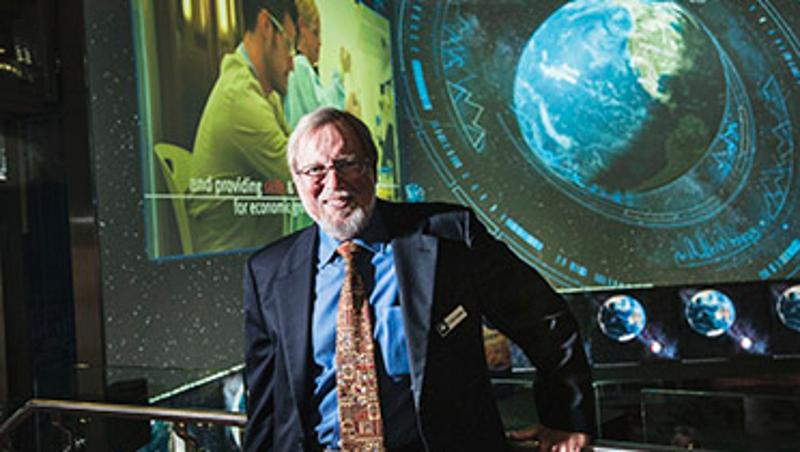
The 21st Conference of Parties (COP21) in Paris won’t secure real action on climate change because member countries aren’t coming clean with their environmental data, a QUT academic has warned.
World-renowned environmental scientist Professor Tim Foresman from QUT’s Institute for Future Environments said participating nations had failed to use spatial technologies effectively to make evidence-based, informed decisions about the best ways of tackling the world’s growing environmental problems.
“Decision-makers on the whole aren’t interested in sharing their own data with other leaders, let alone sharing it with their constituents through open data initiatives,” said Professor Foresman, QUT’s SIBA Chair in Spatial Information.
“They’re too busy keeping their carbon cards close to their chests in the back room climate-energy poker game – it’s quite disappointing.
“When G20 leaders and delegates in Brisbane visited the Cube Globe last November, they saw firsthand the unprecedented power of spatial technologies as tools for visualising complex location-based data sets so that decision-makers can easily analyse and derive well-informed meaning from them.
“Again in Brisbane this year the world's top spatial experts came together at the Pivotal 2015 International Summit to show international government and business leaders how to harness spatial information to address the globe’s big environmental issues and better manage our finite resources in a sustainable manner.”
As the United Nation's chief environmental scientist 2000-2003, Professor Foresman oversaw annual Global Environmental Outlook (GEO) reports that rated the conditions of the planet and its resources.
The first GEO report card he delivered to 192 countries at the 2002 World Summit for Sustainable Development, Johannesburg, contained only D and Fs.
“Since then, those GEO report cards have only gotten worse – and that’s before we even factor in climate change,” Professor Foresman said.
Professor Foresman's leadership of NASA's Digital Earth Initiative 1999-2000 helped pave the way for Google Earth.
In February this year he presented the closing keynote address at the Delhi Sustainable Development Summit, hosted by the former chair of the Intergovernmental Panel on Climate Change (IPCC) Dr Rajendra Pachari.
Professor Foresman said climate change would never be adequately addressed as long as governments were allowed to keep key data and information from the public, something that happened far too often.
“Back in 1995 the US Department of Energy commissioned a report from five national laboratories, known as the Five Labs Study, which showed the US could literally halve its CO2 emissions just by switching building lights off at night,” he said.
“Five years later in 2000 Vice-President Dick Cheney announced that energy conservation was a personal choice, not part of a national energy strategy, and he hid that report from the public’s scrutiny.
“Was this to protect power company profits? He had just stepped down as Haliburton’s CEO.
“We need transparency and open data policies more than ever as we address climate and energy issues for Australia and the world.”
Professor Foresman said spatial experts at Pivotal 2015 identified three principles that would put the power of information back in the hands of the people to address the world’s big climate challenges:
- Facilitate open and transparent access to government-derived information and data - important for effective and timely decision making.
- Integrate spatial information and sustainable development – giving that data a real-world context for better decision-making.
- Build platforms that allow us to visualise governments’ spatial data sets – so the public and scientific communities can easily investigate, interrogate and analyse the information.
"This is the magic of the spatial revolution - the digital earth visualisation of information enables humans to sit down together and make reasonable decisions about the world we live in. It empowers us as citizens of Spaceship Earth to understand the value of the everyday decisions we make as individuals or as part of our communities,” Professor Foresman said.
“By 2020 it’s estimated that 80 per cent of adults worldwide will own a smartphone – a computer infinitely more powerful than those that sent NASA astronauts to the Moon,” Professor Foresman said.
“That’s a terrific example of a tool that turns citizens into bona fide scientists - gathering, crowdsourcing and sharing their own information.
"If we want to enjoy life as we currently know it and act responsibly by leaving our planet in better shape for our children and their children, we need a game changer that will allow us to preserve and maintain this planet - and that game changer is spatial information for informed communities.
“The tools are in our children’s hands, not the COP21 poker players – if only they’d play fairly for the benefit of everyone.”
Media contact:
Niki Widdowson, QUT Media team leader, 0407 585 901 or media@qut.edu.au




